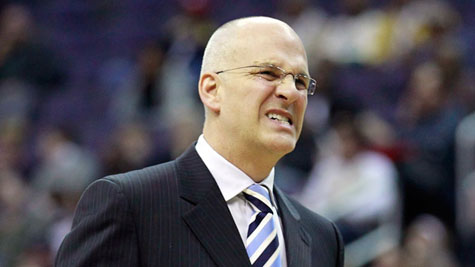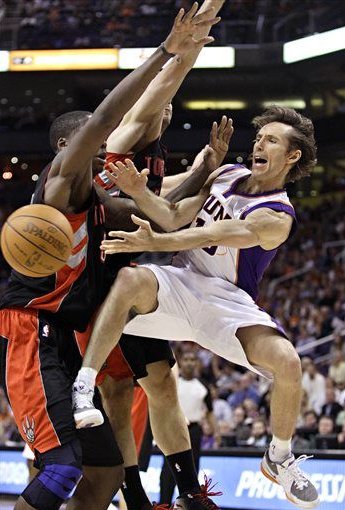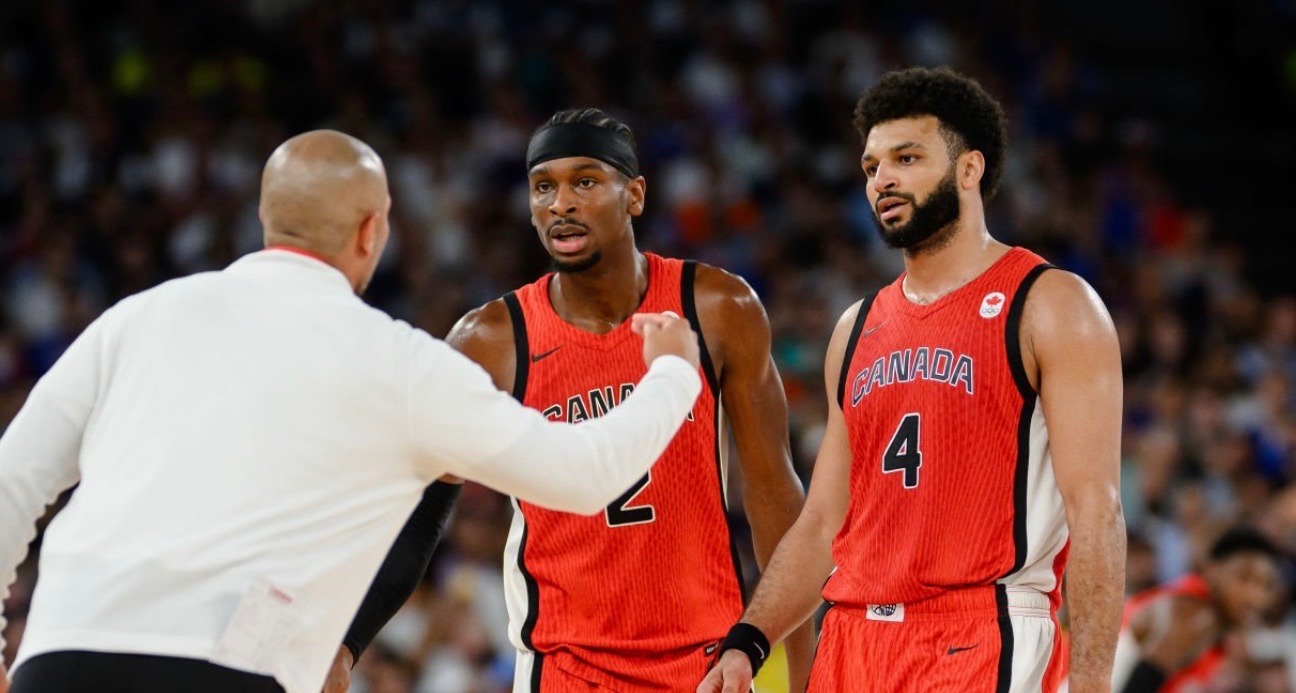On its way back, Team Canada is already seeing Paris from the sky that fell on Tuesday, still taking in the disappointment. But this return to the Olympics 24 years later evoked emotions and feelings that had fallen into oblivion.
It’s the case of former Olympian Dwight Walton, who got especially emotional these days. His emotions ran as high as the players’ on the floor. He just had eyes for the TV. But he couldn’t avoid looking back and getting carried away by nostalgia. He traveled towards the past to recall what the 23-year-old Dwight felt in Canada’s debut in the 1988 Seoul Olympics against Team USA.
“I remember being in the layup line, turning to my teammate Norman Clark and I said: “Norm, can you believe it? We are here!” he said, now at 59 years old.
“We played so many competitions, World Championships, Panamerican Games, exhibition games, so many games up to that point, but being in the Olympics was…” he said while trying to find that word.
The word didn’t eventually come out, but the feelings did.
“My hairs on my body were literally standing up, that was the truth, because you realized we were in the Olympics. It was that one moment,” Walton said.

Canada was able to bring back memories as fresh as if they had just happened on his flawless path toward the knockout stage, where an energetic host France stunned the Canadians. However, the 2024 national team said goodbye to Paris, leaving a lot of positives that must not be glossed over. And Olympians like Walton noticed.
The forward sensed in the actual Canadian national team the pride to represent the country that he is so familiar with.
“You want to have players that play with intent. What I mean with that is, you hear ‘Mamba Mentality.’ If you watch how our guys play defensively, they are tough, they are brash. They take on the individual challenge, but they are also on the weak side as well. They are very connected,” he said. Canada finished sixth out of 12 teams in 1988.
Those who have witnessed gut-wrenching heartbreaks firsthand on the way to the Olympic value the legacy this Canadian team has left. It’s the case of Jay Triano, a teammate of Walton in the 1988 Olympics, with a life fully devoted to making Canadian basketball. He wore the maple leaf on his chest between 1977 and 1988 and since the 90s he served the country as an assistant coach, youth team coach, and head coach of the senior national team in two tenures, between 1994 and 2004 and the 2012-2019 span.
“It’s just exciting because the whole time I was playing or even coaching the big thing was how can we get to the Olympics, how can we have success there, so it’s great to see the players I’ve coached,” said Triano, who serves the Sacramento Kings as one of the assistant coaches of Mike Brown. He coached in the 2000 Olympics, leading the team featuring by 26-year-old Steve Nash.
Triano has been omnipresent in the build-up to get to this crowning moment, sweating on the court and patrolling the sidelines, but he also helped grow the Raptors in their first years in the NBA as an assistant coach between 2002 and 2011.
“You want to have players who play with intent. Our guys are tough, they are brash”
Dwight Walton
However, it’s not just about all this constant and arduous work coming to fruition, the past leading to the present. It’s also about Canada’s present caring about the past, about those who paved the way in harder times, and their valuable teachings.
The start of training camp in Toronto in the last week of June saw the past meeting the present to try to assemble a bright future — another positive takeaway of this trip to Paris, despite being shorter than expected.
The OVO Athletic Centre witnessed a symbolic and significant scene, with Gilgeous-Alexander, Jamal Murray, or Dillon Brooks on the court while being watched by the past, by Dwight Walton, Jay Triano, Howard Kelsey, and other former Olympians. There were up to 60 players according to Josh Lewenberg from TSN.
As another of the omnipresent actors in the history of Canadian basketball and part of the 2000 Olympic team, men’s General Manager Rowan Barrett took this initiative, playing the role of link between different eras and the present.
Walton talked to the players, who were all ears.
“I don’t have any personal relationship with any of the players. I know they are aware of who I am. We don’t speak often, but one thing I’ll say is that the current players were appreciative to see the former Olympians that weekend,” said Walton, who is also giving back to Canadian basketball serving as an assistant coach at Concordia University in Montreal.
Walton got patriotic when talking about the unique feeling of playing in the Olympics, as if he wanted to get the players to feel all those intense emotions that he went through.
“Although they have a status in the NBA in terms of ego, I also think to understand ‘these guys were in the Olympics and now we are Olympians as well.’ It’s a different type of feeling, I’m sure these guys came to Paris two weeks ago and they said ‘Wow, this is really happening.’ The Olympics are not the NBA. You are representing your country, all the country is on your back. It’s not a team, there are millions of people on our side. Their emotions are in your sleeves. They understand this is not just about them, this is bigger than us,” Walton said.

While bridging the past and the present is an achievement Canada has just reached this year, the country has definitely overcome the complex question of NBA player commitment.
In one of the most persistent issues, before putting all these generations together, it took a while for Canada to just bring together all the pieces of the actual team. The lack of a solid commitment from NBA players left Canada in the eternal state of a sleeping giant. However, the country proved the tremendous potential that it could reach when it mixed all his best talent at the first try with the bronze in the last World Cup and coming just one game short from contending for medals in Paris. Sweeping the group of death is nothing to scoff at, even if Canada has so much talent that moral victories may taste bitter.
Triano dealt with this problem firsthand. An issue, on the other hand, was created by the constant growth of NBA quality in Canada since the early 2000s. The best league in the world is just becoming more and more flooded with Canadian players as the foreign country with the most representatives. There were 26 at the start of the last season. In this sense, Canada is breaking records every season.
“It’s just the development of our players. We had two NBA players 20 years ago, and we have a roster that you could fill with NBA players, so I just think the way we develop players in our country has been key. Of course, getting them to play for the country when it’s summertime, when it’s time to rest and relax has been the key,” Triano said.
Despite the depth, Canada ended up missing Zach Edey in the Olympics in an elimination game where France milked the lack of size of the Canadians. However, even without the boost of Andrew Wiggins, the team managed to keep hope to the end. The good news for Canada in terms of commitment is that both of them couldn’t play because the Grizzlies and the Warriors didn’t allow them to play.
“Every summer is different for different reasons, and having the depth we have now helps. Guys are going to be injured, guys are going to be in a contract situation, every country goes through it, you are always going to have something and the depth really helps, having Shai and Jamal is really important because there are superstars who can take over the game,” he said.
“The same thing happened in the 2000 Olympics. We had Steve Nash, he turned into a superstar in the games moving forward. It helped his game and helps the Canadian players now because there is a good reason to want to play in the summertime. It can help your career, not hurt your career,” Triano said.
“The time Steve Nash spent with Shai Gilgeous-Alexander was key”
Jay Triano
Canada is taking direct or indirect advantage of the inheritance of key actors, and Steve Nash is the paradigm. Apart from inspiring lots of Canadian players as a two-time NBA MVP, and in his former role as general manager of the men’s team, Nash has had an imprint on the members of the actual roster for them to understand the importance of the national team.
“Shai was really young when Steve played. I think the fact Steve was an MVP and he took time to spend with Shai was key. And Shai was like that with a lot of players. He is RJ Barrett’s godfather. Even when Steve was the general manager he was getting a lot of instruction from Steve. When you have the story he has, an MVP in the NBA, that carries a lot of weight with young players,” Triano said.
The Nash mentorship with Gilgeous-Alexander left some hilarious stories. Triano told The Ringer in 2015 he was about to tell off a teen 17-year-old Shai for coming late to the bus — and it turned out the point guard was already working out with Nash in the gym. The greatest Canadian player of all time instilled such a work ethic in Toronto’s native that it’s comparable to the one Nash had. James DePoe, the team manager of the men’s team and working for Canada Basketball since 2010, said he had never seen a player so dedicated to the craft behind the scenes since the era of the two-time NBA MVP.
Triano has also been working hard behind the scenes for the commitment of the NBA players. The Kings assistant coach reflected on what had changed.
“I talked to Canadian players in the NBA. You can be an NBA player, you can even be an NBA All-Star, and you can do a lot. A lot of people can do that, but not a lot of people can play for a medal for your country. I think this is the passion these guys have. NBA championships happen every single year, Olympics once every four years,” he said.
“They see it as a benefit to their career. I just think the education of the international game is a selling factor,” Triano said.

The former Canada coach revealed he gave a hand to Jordi Fernandez to convince certain players to make themselves available to the national team.
“We talked quite a bit before he took the job. He had a lot of questions as I had coached the team and played for Canada. We talk a lot about the national team and players. I even made a phone call for him to convince Andrew Nembhard to play because he hadn’t played the summer before. I talked to Lyles to convince him to play because that would be an experience he would never forget,” he said.
Triano said he likes Fernandez’s approach on both ends of the floor. The Spaniard is another tremendous asset Canada has gained in the two last years, as the coach who has eventually brought a core of players together and has created an identity on and off the court, with competitiveness and terrific defensive toughness as basic principles.
The Badalona native led Canada to its first medal in the World Cup last year and the Canadians made it to the Olympics quarter-final with a perfect winning record in the group of death with Greece, Australia, and reigning European champion Spain.
While Fernandez didn’t talk about his future in the post-game press conference, he didn’t hint at any exit from Canada, and he kept talking in the plural when touching on upcoming challenges for the team. He will coach the Brooklyn Nets next season, hitting his first stint as a head coach in the NBA.
Dwight Walton praised the fit Fernandez makes with Canada.
“I’ve had a brief conversation with Jordi several times, I think Rowan Barrett made a home run with Jordi here, he’s a well-deserved Canada coach. The thing I like about his balance is he is tough but he is fair, he doesn’t care if you are Shai Gilgeous-Alexander or the 12th man on the roster. He will hold you accountable, he will let you know what is expected from you but, at the same time, as hard he is on guys in practice the very nice sentence will be coming out of his mouth,” Walton said.
“There is a medium ground with him, that’s why he is balanced and that’s why the players respect and listen to him. It’s the perfect type of coach you need for today’s athletes,” he said.
“Rowan Barrett made a home run with Jordi Fernandez”
Dwight Walton
Triano also looks at one of the guys who sits next to Jordi on the sidelines, assistant coach Nate Mitchell, one of the most significant links between the hard and constant work in the past and the fruits Canada is reaping in the present.
“In player development, one thing started at the end of my last tenure was that guys like Nate Mitchell would have things to work with players in the team right now along in Toronto. There is a training program Nate has been most in charge of, and if you look at the players Nate Mitchell has worked out there are Andrew Nembhard, Shai Gilgeous-Alexander, RJ Barrett… He is a guy who has been in the corner for a lot of these guys for individual work,” Triano said.
On top of everything, Walton highlighted the work of Rowan Barrett and Michael Bartlett, the president of Canada Basketball.
“I have to give major credit to Bartlett and his supporting staff and to my good friend and former teammate in Canada Basketball Rowan Barrett. They had to put up with a lot of criticism and at the same time he didn’t just want to improve the team on the basketball court, but also the organization as a whole,” he said.
“I highlight at some point some alumni felt totally separated from the organization. That weekend went a long way in repairing some of these relationships, and some of these feelings. We just want to feel some way attached to this,” Walton said.
History is about knowing the past to understand the present, and Canada has reconciled both eras.
After getting knocked out by France in the quarter-final 24 years ago, history repeated itself this time around. History and the present are reconciled in more ways than one, for better and for worse. A lot of history still has to be made by Canada. The team is young, and there are more and more Canadians entering the NBA every year. There’s no reason why Canada won’t have a better team down the road. And this experience in France, this relative failure, will just be another lesson to propel Canada into that future.
Walton didn’t hesitate when asked if it could be expected the country where the basketball inventor was born would take over the world.
“Yes, of course.”



